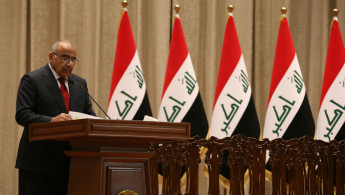Iraq PM lands in Riyadh amid warming ties
Adel Abdel Mahdi met Saudi King Salman amid a steady warming of ties between Baghdad and Riyadh after decades of strain, reported official Saudi media.
The two countries signed 13 major agreements, Saudi-owned Al-Arabiya television said, without giving further details.
Earlier this month, Saudi Arabia announced a billion-dollar aid package for Iraq, pledging stronger relations as the kingdom competes with Iran for influence over Iraq.
The Gulf powerhouse severed relations and closed its border with its northern neighbour after late Iraqi dictator Saddam Hussein's August 1990 invasion of Kuwait.
But a flurry of visits between the two countries in recent months has indicated a thawing of ties as Riyadh seeks to counter Iran's strong presence in Iraqi politics.
Baghdad is also seeking economic benefits from closer ties with the wealthy kingdom, especially as it looks to repair the destruction left by years of fighting against the Islamic State (IS) group.
Iran has been highly influential in Iraq since the toppling of Saddam in 2003, and was a key player in the territorial defeat of IS.
Abdel Mahdi, named premier last October, has said Iraq now wants good relations with both Tehran and Washington.
In January, Faleh al-Fayyadh, Chairman of the Popular Mobilisation Forces, or Hashd al-Shaabi in Arabic visited Riyadh in an unannounced visit which officials said was part of efforts to reassure Saudi Arabia of the PMF's presence in Iraq.
"They discussed the relations between both countries and stressed the importance of strengthening them," a source close to the Iraqi Prime Minister Adel Abdul Mahdi's office told The New Arab at the time.
"The visit came within the framework of conveying reassurances to Riyadh over the presence of the PMF and the paramilitary group's openness towards the kingdom," the source added.
The Shia-dominated PMF were instrumental in the fight against the Islamic State group, as they pushed IS militants back from the gates to Baghdad, and later drove them out of major cities across northern Iraq.
The Iran-backed force was established in 2014 after Grand Ayatollah Ali al-Sistani urged Iraqi citizens to take up arms against IS militants who had swept aside government forces and seized control of much of northern Iraq, threatening the capital Baghdad itself.
The US reimposed tough sanctions on Tehran's energy and finance sectors last year but it has granted Baghdad several temporary exemptions to allow it keep importing Iranian gas and electricity, crucial to Iraq's faltering power sector.
Follow us on Twitter: @The_NewArab





 Follow the Middle East's top stories in English at The New Arab on Google News
Follow the Middle East's top stories in English at The New Arab on Google News
![The UAE is widely suspected of arming the RSF militia [Getty]](/sites/default/files/styles/image_330x185/public/2024-11/GettyImages-472529908.jpg?h=69f2b9d0&itok=Yauw3YTG)
![Netanyahu furiously denounced the ICC [Getty]](/sites/default/files/styles/image_330x185/public/2024-11/GettyImages-2169352575.jpg?h=199d8c1f&itok=-vRiruf5)
![Both Hamas and the Palestinian Authority welcomed the ICC arrest warrants [Getty]](/sites/default/files/styles/image_330x185/public/2024-11/GettyImages-2178351173.jpg?h=199d8c1f&itok=TV858iVg)